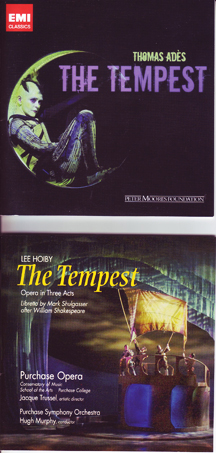Shakespeare’s Texts as Opera Libretti
 |
By FRANK BEHRENS
ART TIMES Mar/ Apr 2010
A long time ago, I ran in this journal a long series of essays on operas in French, German and Italian with libretti based on Shakespearean plays. This time, I wish to consider the problems of English operas that use Shakespeare’s actual words or adapt them in some way or other.
--------------------------------------------------------------------
One wishes to set a Shakespeare play to music as an opera. What are the choices? In fact, what are the chances of success? Of course, compelling music is most critical in such a translation. Equally important is an intelligent treatment of the original text. So again, what are the choices?
Obviously, one must cut. No one would dream of keeping every line of a Shakespeare play and trying to set the whole to music for the simplest of reasons: it takes longer to sing a line than to speak it.
That said, does one keep unaltered what is left? For “Salome,” Richard Strauss took about three-fourths of Oscar Wilde’s text (in German) and set what was left as is. Strauss had the talent to carry it off. Yes, there are moments when things do drag just a little; but for the most part, he managed to set an awful lot of prose—no mean feat—to powerful music.
When Gustav Holst composed “At the Boar’s Head,” he chose the prose scene in which Hal and Falstaff alternate playing King and Prince. (That is, “Henry IV, Part 1,” Act II, scene iv.) Where he sticks to the original text, the vocal line is not very interesting musically. After all, setting prose to music is quite a challenge and this composer did not quite meet it. However, in the sections of this short work which are not set to prose, such as Hal’s singing Sonnet No. XIX, the score is melodic and attractive.
Ralph Vaughan Williams did the same with his “Sir John in Love.” Passages taken straight from the prose text of “The Merry Wives of Windsor” are mingled with English folk songs that make the score a delight. Why this wonderful piece is not part of the regular repertory is beyond me.
The failure of Samuel Barber’s “Antony and Cleopatra,” commissioned to celebrate the opening of the new Metropolitan Opera House in Lincoln Center, was (I feel) due to his libretto, which adhered faithfully to an abridged version of the original text. Even Strauss could not sustain enough musical interest in his post-“Elektra” operas because of the libretti; and Barber likewise failed to create any better than a declamatory vocal line for his singers.
Benjamin Britten’s “A Midsummer Night’s Dream” has wonderful things happening in the orchestra but little more than that same declamatory vocal line that proves so boring after a short while. Only when he lets his lovers sing together in a short chorale do things perk up a bit. (I once was showing a video scene from this work to a Continuing Education class, and one of them asked me to skip to the next work. I quite agreed with her.)
What inspired me to discuss this topic of taking Shakespeare on in musical terms was the release of two operas based on “The Tempest.” The one with a score by Thomas Ades (on an EMI Classics CD set) has librettist Meredith Oakes wisely making cuts and tightening up what was left by transforming them into shorter lines, some of which rhyme. To pick a random example: “I have been captive/With you twelve years/I must be active/In higher spheres…” and so on.
I find that the orchestra has much that is interesting to say while the singers are given all sorts of vocal pyrotechnics to add variety. What happens is that the words, although sung in English, are barely understandable without the aid of the printed text. Still, after a while, one does hope for a melody of some sort.
Lee Hoiby’s “The Tempest” has a libretto by Mark Shulgasser, in which the parts of the original he retained are word for word. I need hardly say that the declamatory vocalization is much in evidence. (This version is available on Troy CDs.) Every time I think Hoiby is about to approach a melody — as in Ariel’s songs — he disappoints.
For some reason, contemporary composers do not feel that the singers need be given any melodic lines. Shall I be cynical and guess they simply cannot do so, like the artist who paints abstractions because he cannot paint a realistic apple? Or shall I give them the benefit of a doubt and agree that they might feel melody would destroy the drama? Why, in that case, compose opera at all?
I would rather hear Hoiby than Ades, but give me Verdi’s “Otello” for the perfect blend of melodic vocal lines, powerful orchestration that is not for one moment boring, and all the drama even Shakespeare could have desired.
fbehrens@ne.rr.com
